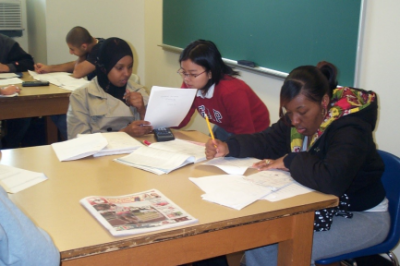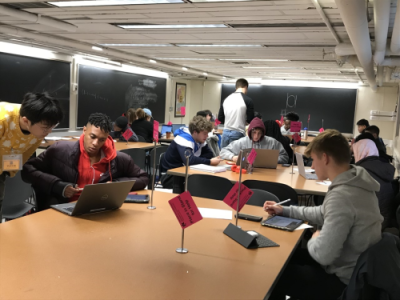
When the Mathematics and Statistics Learning Center (MSLC) opened for the semester on Aug. 25, 2019, an unprecedented 106 students signed-in for tutoring. Autumn 2019 continued an upward trend in the number of students utilizing tutoring, with more than 5,000 Math 1151 student visits and over 1,000 Math 2153 student visits, compared to 3,662 and 288 student visits in autumn 2016, respectively. To handle such large growth, the MSLC staff have worked hard to meet student needs within their budget, implementing data-driven decision-making to ensure tutor-staffing levels match anticipated student attendance and seeking to minimize tutor down time. In addition, the MSLC has been conscious of the need for long-term budget plans to better utilize space in order to more effectively serve students.
The heart of MSLC tutoring is the team of tutors who seek to spend one-on-one time with students when they can, but at peak hours must juggle the needs of several students at once while still ensuring students are learning as opposed to just receiving a correct homework answer.
Mathematics graduate students and undergraduate teaching assistants are invaluable to the MSLC’s tutoring operations, both in terms of their time and course-specific mathematical expertise that they can lend to MSLC undergraduate tutors should need arise. In addition, tutoring hours are an opportunity for TA’s to listen to students’ mathematical thinking, cultivate a sense for where students struggle and develop pedagogical techniques for helping students past those difficulties. Undergraduate tutors also undergo research-based training aimed to help develop pedagogical best-practices.
When tutors have the time to work one-on-one with students, they seek to work with the individual’s current conceptions and create a dialog of collaboration to allow the student to be an active participant in their learning. Students attending the center have provided feedback regarding how valuable tutoring was to their college experience. They cite having a one-on-one conversation with a tutor as beneficial for addressing their struggles and for adjusting their overall study methods. The MSLC prides itself on being more than a homework-answer service by seeking to help students learn in a way that is lasting and impactful.

The MSLC is also more than just tutoring. Included within the MSLC’s mission statement is the call “to provide training and support to tutors, instructors and administrators of lower-division mathematics and statistics courses.” This includes technology support via with Carmen, online homework systems, and TopHat polling. In addition, the MSLC supports creation and development of online courses and course materials such as the Flipped and Flexible Calculus and online Math 1116 course. With the MSLC staff’s background in mathematics education, they serve as a resource for course coordinators and instructors wanting to adjust their course design or materials. The MSLC has also worked with the Mathematics Education Forum and Calculus Design Team to support department-wide initiatives to improve the experience of lower-level mathematics students.
Currently, the MSLC is involved in the department’s Student Engagement in Mathematics through an Institutional Network for Active Learning (SEMINAL) grant, which is part of the National Science Foundation’s effort to better understand how to sustain success in implementing active learning in undergraduate mathematics classes and how to influence similar success at other institutions. The MSLC serves to support cultural change in the department with respect to teaching lower-level courses by assisting in the creation of professional development activities for instructors, such as reading groups, active learning lunches and an incoming workshop for lecturers, postdocs and faculty new to the department.
The MSLC’s work also extends beyond the Department of Mathematics to other areas of Ohio State, such as a partnership with the Office of Diversity and Inclusion to prepare Young Scholars students for their college mathematics experience and collaborations with other university tutoring centers to share tutor-training practices. The MSLC has additionally been on university-wide search and implementation committees for teaching technologies such as Carmen Canvas and Zoom. The MSLC is also active in the research community, presenting at conferences such as the Research in Undergraduate Mathematics Education conference and the Mathematical Association of America (MAA)’s MathFest.
In the future, the MSLC plans to remain active in outreach by hosting an in-person conference for mathematics learning center leaders. The center will continue utilizing the latest research to assist the department with identifying new teaching technologies and best-practice pedagogy to improve the student-learning experience.
Article contributed by Darry Andrews & the MSLC Staff
Dr. Andrews is the Director of the MSLC.
